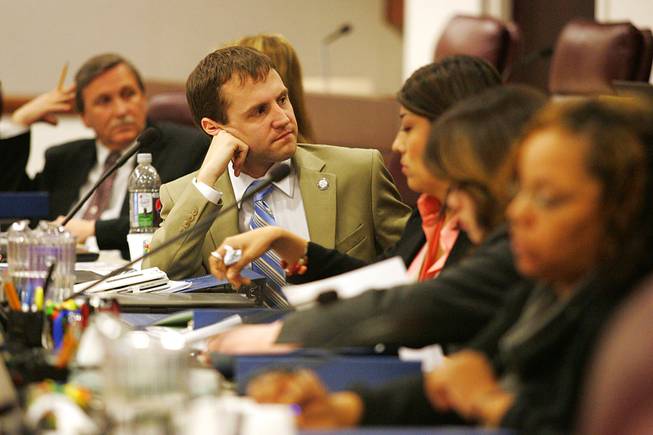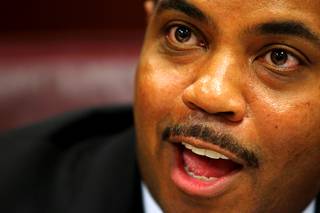
Sam Morris / Las Vegas Sun
Freshman Assemblyman Elliot Anderson listens to Assembly Taxation Committee Chairwoman Marilyn Kirkpatrick during the second day of the 2011 legislative session Tuesday, February 8, 2011 in Carson City.
Wednesday, Feb. 9, 2011 | 2 a.m.
Sun archives
- Sandoval will need to write in loophole to pass budget (2-5-2011)
- Senior programs not spared from cuts in Sandoval budget (2-2-2011)
- Gov. Brian Sandoval’s budget means job, service cuts for Clark County (1-26-2011)
- State budget plan heavy on cuts, light on solutions (1-25-2011)
- Soft words during State of the State hide Nevada in pain (1-25-2011)
- Teachers not pleased with most of Sandoval’s speech (1-25-2011)
- In response, Democrats say taxes might be part of budget solution (1-24-2011)
- State of the State: How doors could open for Nevada (1-24-2011)
- Is Brian Sandoval’s ‘shared-sacrifice’ budget the solution to state’s economic woes? (1-23-2011)
- Most vulnerable await budget cuts with trepidation (1-23-2011)
- Increasingly worried liberals seek pushback on Sandoval budget (1-21-2011)
- Construction industry: Raise taxes for job growth (1-20-2011)
- Groups seek higher taxes on tobacco and gasoline (1-20-2011)
- Sandoval warns of consolidation, job losses in state government (1-19-2011)
If titles could be taken at face value, then the revamping of Nevada’s boom-and-bust tax structure began Tuesday. But the taxation committee in the Assembly and its counterpart in the Senate, which met for the first time on Day 2 of the 2011 Legislature, don’t actually craft the tax packages that get passed by the Legislature.
That work is carried out behind closed doors by a small group of legislative leaders.
Meanwhile, the tax committees put on a show for public consumption: holding hearings on bills, accepting testimony and reviewing a government tax structure that has the state $2.2 billion short of the funding needed to maintain current services.
Yet in a departure from the past, several of the Senate leaders who will work behind closed doors are the same ones who will handle the public entertainment.
The Senate revenue committee — newly renamed, some say, to obscure the fact that it’s talking about taxes — largely mirrors the Senate finance committee, meaning the same people will make both the taxing and spending decisions. The taxing committee includes Senate Majority Leader Steven Horsford, D-North Las Vegas, and Senate Minority Leader Mike McGinness. Only one freshman sits on the revenue committee.
It’s a different story in the Assembly, where freshmen outnumber veterans.
The only member of leadership on the taxation committee is the chairwoman, Assistant Majority Leader Marilyn Kirkpatrick, D-North Las Vegas, who lectured the newcomers Tuesday on how to use their time:
“I can see everybody’s computer and know what everybody’s looking at,” she warned.
Then committee staff launched into a three-hour lecture. It was Nevada Taxation 101, highlighting the temporary fixes the Legislature has relied on to get through three years of revenue-draining recession.
By comparison, it was a doctorate-level discussion in the Senate, where committee Chairwoman Sheila Leslie, D-Reno, vowed to tackle the state’s wobbly tax structure.
“We want to really look at the tax system we have in the state,” she said. “It’s not news to anyone that our state is facing structural deficits, cyclical deficits. It’s time to take out the unpredictability in our system and establish a tax structure that really is ready for the 21st century.”
Cognizant of the eye-rolling over the committee’s new name, Leslie quickly dispelled the notion that they wouldn’t address by name the most pressing issue before the Legislature this session.
“We’re not afraid of the T-word,” she said. “I’ll say it: taxes.”
It appears based on Tuesday that the Assembly would be happy to allow the Senate to do the talking and the heavy lifting on taxes.
And although it’s true that any tax package won’t be crafted in either committee, it’s also accepted that such deals won’t be struck until the waning hours of the session.
In 2009, for example, the eventual tax package was heard in a committee of the whole — the entire Senate followed by the entire Assembly — at midnight with only a few hours’ notice.
In fact, taxpayer advocate Carole Vilardo noted that in the past 30 years, the Legislature has only twice passed a major tax change in the first half of the session. In 1981 and 2005, lawmakers revamped the state’s property tax system before the April 1 tax bills were due.
“Always, when they’re dealing with tax issues, it’s the end of the session,” Vilardo said. “And we always end up with more unintended consequences than we should.”
Legislative leaders did nothing to dispel assumptions that any serious tax issues will be taken up before the end of session.
“Those are the unfortunate limitations of our 120-day sessions,” Horsford said. “We are just getting the explanation of how the governor’s budget works. It’s a constitutional process. First we have to review the budget and then decide how to fund it.”
Assembly leaders deny they’re handing the work to the Senate.
Asked what role she sees her committee having in crafting any eventual tax package, Kirkpatrick joked: “Nice try,” fearing the reporter was trying to trick her into acknowledging a tax package is in the works.
Assemblywoman Debbie Smith, D-Sparks, however, said the taxation committee is mostly freshmen because nearly half of the Assembly membership are freshmen.
“We’re not afraid of anything,” Smith said.


Join the Discussion:
Check this out for a full explanation of our conversion to the LiveFyre commenting system and instructions on how to sign up for an account.
Full comments policy